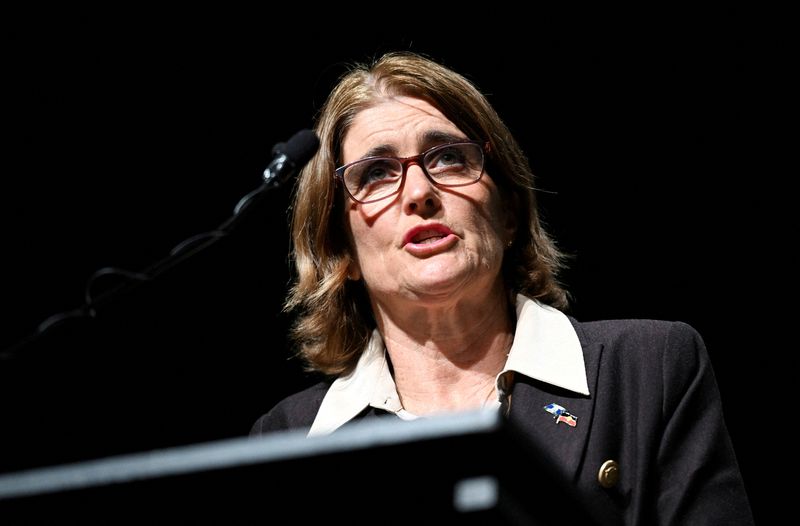By Stella Qiu
SYDNEY (Reuters) -When Michele Bullock takes over as the first woman to head Australia's central bank on Monday, she inherits an economy with inflation moderating, employment strong and growth still afloat.
The Reserve Bank of Australia (RBA) has been on hold for three months after raising interest rates aggressively for more than a year. Markets are wagering Bullock will keep them steady in her first meeting as governor next month, and some economists say that her eventual first policy change might be a rate cut.
But Bullock, deputy governor since April 2022, has said rates may need to rise again.
"Inflation is still too high in Australia," she said in late August. "It is coming down... but it's still too high, so the first priority is still to maintain a focus on bringing inflation back down to target."
The RBA raised rates by 400 basis points in the 13 months through June to an 11-year high 4.1%, and consumer price inflation has slowed to 4.9% in July from 8.4% in December. The bank forecasts it will return to the RBA's 2%-3% target band in late 2025.
The tightening has slowed Australia's growth, but analysts think the economy could still achieve a soft landing.
"Based on the facts of today, it looks like they have done enough and they will get inflation back into the target with what they've done so far," said Cherelle Murphy, chief economist at EY Oceania.
The risks of a price-wage spiral and an upward shift in inflation expectations remain, "but it looks like everything is going pretty much to the plan, and we have got to be pretty happy about that," she said.
By contrast, aggressive rate hikes in neighbouring New Zealand have tipped its economy into recession, Canada's economy unexpectedly shrank in the second quarter and Germany, Europe's biggest economy, is forecast to slip into recession this year.
If Australia avoids recession and delivers a soft landing, history may judge outgoing Governor Philip Lowe more kindly.
Lowe was subjected to unprecedented media scrutiny and public criticism for saying during COVID-19 that the RBA's central case was that rates were unlikely to rise until 2024 - only to reverse course in May 2022 as inflation surged.
Lowe's (NYSE:LOW) forward guidance was seen as a key reason the government did not extend his term.
Treasurer Jim Chalmers thanked Lowe on Friday for his service and said he was looking forward to continuing to work with Bullock. In the search to replace Bullock as deputy, Chalmers has indicated the government is looking at candidates inside and outside the central bank.
Bullock also takes on the job of implementing the recommendations of a wide-ranging review into the RBA, including speeches by the previously low-key board members and regular press conferences by the governor after policy decisions.

"It is going to be a bit of a challenge, I think, for markets to digest this change of structure," said Stephen Halmarick, chief economist at Commonwealth Bank of Australia (OTC:CMWAY).
"I think if people are expecting changes in the (policy) outcomes, it's probably not going to happen, but it would be a different way of doing things."